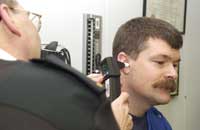Study on the effects of noise on human performance
Purpose
The objective of this study was to determine whether the noise level of 72 A-weighted decibels (dBA) on the International Space Station (ISS) affects physiological or psychological performance of astronauts on long-term missions.
Background
The astronauts of the ISS are exposed to an average noise level of 72 dBA for the entire duration of their stay on the ISS, which can last up to six months.
The noise is caused by essential equipment that runs continually, such as generators for life support and ventilation systems. Noise may affect health and mental well-being. In fact, noise is a stressor that affects us in a way similar to extreme cold. Such stressors may cause changes in heart rate and blood flow to the brain, as well as changes in breathing, skeletal– muscle tension and the chemical make-up of blood and urine.

Inside view of the Zvezda or ISS service module. (Credit: NASA)
Previous studies have shown that it is safe to listen to noise levels less than 85 dBA over an eight-hour period without protection for hearing. In Canada the limit for federal employees is 87 dBA over a period of eight hours. The following table gives examples of some noise levels people may be exposed to on Earth:
| Noise level | Sound |
|---|---|
| 10 dBA | normal breathing |
| 20 dBA | quiet home |
| 40 dBA | quiet office, library |
| 60 dBA | normal conversation |
| 70 dBA | freeway traffic |
| 80 dBA | vacuum cleaner, doorbell, ringing telephone, whistling kettle |
| 90 dBA | tractor |
| 100 dBA | snow blower, leaf blower |
| 120 dBA | ambulance siren |
| 170 dBA | shotgun |
| 180 dBA | rocket launching from pad |
While astronauts on the ISS are exposed to lower noise levels than the accepted limit of 87 dBA, they are exposed to this noise twenty-four hours a day, seven days a week. A review of hearing tests in a small group of Russian cosmonauts after long-term spaceflights shows cases of both temporary and permanent post-flight hearing loss. This was in spite of the fact that the noise levels the cosmonauts experienced were lower than those linked to noise-induced hearing loss on the ground.
ISS astronauts have also reported temporary hearing loss. To help reduce the noise, mufflers and isolation blankets are used throughout the ISS. Although hearing protection headsets are available, astronauts do not use them all the time, as they are uncomfortable to wear continuously and make communication with other crewmembers difficult. Since hearing needs to be tested in a quiet environment, researchers' efforts to record in-flight changes in hearing have not been successful because of the continuous noise on the ISS.

The chamber used to test subgroups. It was comprised of three pods: one for living and sleeping, one for sink and toilet, and one for testing. (Credit: DRDC-Toronto)
Project description
This project was sponsored by the Canadian Space Agency (CSA) and conducted at Defense Research and Development Canada-Toronto (DRDC-Toronto) in collaboration with the European Space Agency (ESA) and the National Aeronautics and Space Administration (NASA). Five sub-groups of five normal-hearing male and female subjects, aged 20 to 50 years, were tested sequentially over a period of five weeks. Sub-groups spent a period of 70 hours in a chamber that modeled conditions on the ISS. The chamber was comprised of three separate but connecting pods: one for living and sleeping, one with a sink and toilet, and one for testing.
Sub-groups were assigned to one of three conditions: quiet throughout the 70-hour period of confinement, continuous noise throughout the period of confinement, or continuous noise during the day only. To ensure that the noise was as similar to that of the ISS as possible, recordings from the ISS service module were played through speakers in each compartment of the chamber.
While confined, subjects were tested in morning, afternoon and evening sessions during 14-hour workdays. Researchers tested the subjects for effects of noise on hearing, speech communication, problem-solving, memory, reaction time, fatigue, motivation and mood, heart rate, blood pressure, and quality of sleep.

Inside view of the test chamber. (Credit: DRDC-Toronto)
Results
The results indicate that the subjects were not significantly affected by the various noise exposure conditions. These results do not reflect the post-flight hearing loss reported by astronauts and cosmonauts. This could be due to one or a combination of the following factors:
- the relatively short duration of noise exposure compared to that of astronauts on the ISS,
- the small number of test subjects,
- the group of subjects did not reflect the characteristics of the astronaut population or
- the test subjects were not exposed to the stresses of spaceflight such as isolation and confinement, or microgravity.
Further research is required to understand how spaceflight affects hearing and to determine whether moderate noise affects physiological and psychological performance during long-duration missions.

A researcher is checking the condition of the tympanic membrane of a test subject. (Credit: DRDC-Toronto)
Additional reading
Buckey, J.C. Jr., F.E. Musiek, R. Kline-Schoder, J.C. Clark, S. Hart, and J. Havelka, "Hearing loss in space." Aviation, Space and Environmental Medicine, 72(12), 1121–1124, 2001.
Explore further
- Date modified: